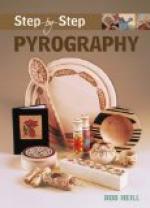“That was my playfellow,” he said. “I have not seen him for a long time. He and his people lived here once, but they ran away when there came to be so many houses. I used to hide in the woods when father came seeking me at Mother Izan’s, and my playfellow gave me nuts and berries and wild honey. He said that if father beat me I was to go and live with his people. I think I should if you had not come.”
Howel, the mason, was a bewildered man that night. He agreed, before he fairly knew what he was about, to David’s adopting Gwillym as his own son, to go with him to the house of a good woman in London and be taught all that a lad should learn. In time he might be able to carve stone saints and angels, kings and queens, gargoyles and griffins, for great cathedrals. And all this had come of the forbidden clay toys.
“I beat him week after week,” he muttered, “for melling wi’ mud images and running away to the forest to play wi’ devils. ’Twas no good to him, being reared by an old witch.”
David’s mouth set in a grim line and he rubbed the little black head with his crooked, skillful, weatherworn hand.
“Even a child is known by his doings, whether his heart be pure, and whether it be right,” he said half aloud as he led Gwillym away toward his own lodgings. “But the fool hates knowledge. The hearing ear and the seeing eye are the gifts of the Lord—and if a man was meant to be a bat or a donkey he’d ha’ been made so. When Solomon said that a wise son maketh a glad father he didna reckon on a father being a fule. Ye’ll say yer farewells to Auld Hornie, laddie, and then we’ll gang awa’ to London and leave Solomon’s Seal i’ the wilderness.”
And that was how the little wild cave-man of the forest came to be inside a village church, under the font for the christening.
THE LEPRECHAUN
Terence he was a harper tall, and served the King
o’ Kildare,
And lords and lodies free-handed all gave largesse
to him there,
And once when he followed the crescent moon to the
rose of a summer dawn,
Wandering down the mountain-side, he met the Leprechaun.
And a wondrous power of heart and voice came over Terence then, For a secret in his harp-strings lay, to call to the hearts of men, That he could make magic of common songs, and none might understand The words he said nor the dreams they bred—for he had them of Fairyland.
Eily she was a colleen fair, the light of the harper’s eyes, And he won by the aid of the Leprechaun his long-desired prize. The wedding-feast was but just begun,—when ’twixt the dark and the day, Quick as the water that runs to earth the Leprechaun slipped away!
So the daylight came, and the dreams were past, and
the wild harp
sang no more,
And Terence looked at the cold black hearth and the
silent open door,
And he cried, “I have sold my life this night,
ye have my heart in
pawn,—
Take wife and gold, but come ye back, ye little Leprechaun!”




